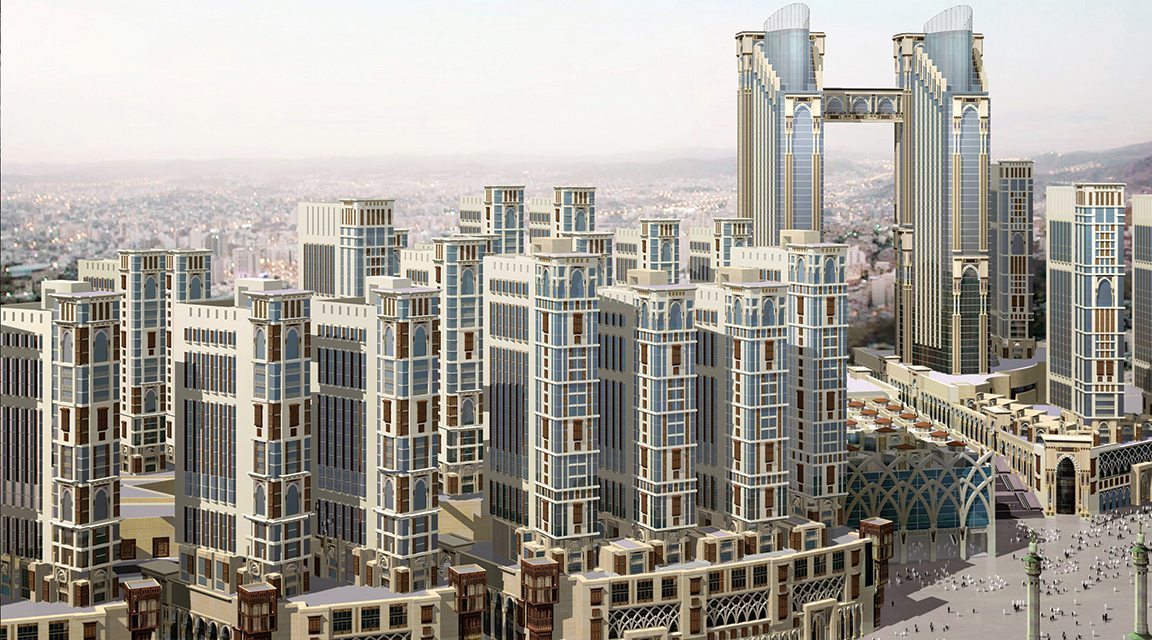

Mecca project developer has missed payment on $800m loan
The news about Saudi developer Jabal Omar Development Companys (JODCs) financial troubles came as a surprise to many, considering its status as a strategic private sector entity, ring-fenced even from foreign investors, who are not allowed to buy its shares.
A developer that exclusively builds and manages commercial, residential and retail projects close to Islams holiest site of Meccas Grand Mosque could not possibly run into financial problems. This, at least, was the view of most people.
What has caused it? Is it a case of short-term receivables creating bottlenecks in cash flows, or is it just sheer mismanagement of cash in hand? The answer is that we do not know yet and JODC has not explained the reasons either in its stock exchange filing.
Worrying question
The more worrying question, however, is whether JODC's is a standalone case or whether there are more developers feeling aggravated financial pain on the back of the economic slowdown in the kingdom.
If that is the case, it casts doubt on how successful the government will be in its efforts to drive the private sector as it curbs spending amid shrinking oil revenues and increased demand for housing and commercial real estate.
The company has missed the payment, but technically it does not constitute a default unless the lender, in this case the state, forces a default on the firm.
It is unlikely Riyadh is going to push the developer over the edge for delayed payments. JODC is at the front and centre of the kingdoms religious tourism ambitions and it would not make sense for the government to stir the pot too much.
The firm has said it is in talks with banks to arrange more finances as its sustainability depends on finding funds to repay short-term debts. The company has not revealed what the total load of its short-term debt is; how much of that is borrowed from the state and what is the chunk due for repayments to financial institutions?
Massive decline
JODC has swung to a SR75.5m ($20.1m) loss in the three months ending 31 December 2015 from a profit of SR145.2m in the same period in 2014. The company also reported a SR125.5m loss in the third quarter of last year.
With declining profits, it will be a difficult for JODC to build a case with local lenders to give it more funding in order to meet short-term financial commitments. The firm still has a bit of breathing space as it plans to tap into a $240m undrawn credit facility from a local bank, which it intends to use to pay the state loan. How many more banks will extend loans to a company with slumping profits and a deteriorating credit profile is anybodys guess.
The chances of getting a nod from lenders other than the relationship banks are slim as financiers in the kingdom are already jittery about further exposing their loan books to so-called risky sectors such as contracting and property finance.
Liquidity in the banking system is getting tighter by the day as the government has resorted to placing riyal-denominated bonds with local financial institutions to plug the budget deficit. Saudi Arabia is waging a price war against US shale producers to protect its share of the global oil trade. The price of oil has dropped about 70 per cent since mid-2014, denting the governments financial muscle, as it relies heavily on the sale of hydrocarbons for revenues.
Tightening liquidity
Oil prices are not expected the claw their way back up significantly in the near future and the government is likely to continue placing bond offerings with local lenders as part of its wider funding plans. Under the circumstances, the banks will have to prioritise their funding options and will be less inclined to come to the rescue of troubled developers.
For JODC, a total long-term debt of $2bn on the balance sheet also does not help its cause.
MEED reported in September last year that the company also raised SR8bn to complete phase two (S3-4), phase four (S9-11) and phase five (S6-8) of the Jabal Omar development in Mecca.
The credit facility was extended by the local Sabb, partly owned by the UKs HSBC, and Samba Financial Group. It also refinanced an earlier SR2bn bridge loan from the same lenders. The ten-year Islamic financing was secured on the land JODC is working on in Mecca.
The developer has been working since 2007 to secure funds for its 2.5 million-square-metre project and also secured about SR1.4bn of loans in 2010.
You might also like...

Rainmaking in the world economy
19 April 2024

Oman receives Madha industrial city tender prices
19 April 2024

Neom seeks to raise funds in $1.3bn sukuk sale
19 April 2024

Saudi firm advances Neutral Zone real estate plans
19 April 2024
A MEED Subscription...
Subscribe or upgrade your current MEED.com package to support your strategic planning with the MENA region’s best source of business information. Proceed to our online shop below to find out more about the features in each package.








